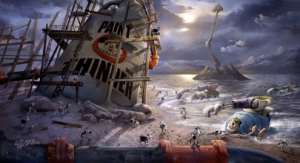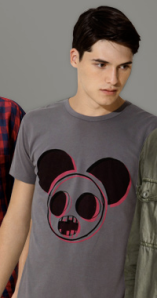M-I-C
See you real soon!
K-E-Y
Why? Because we like you.
M-O-U-S-E.
Ah, the Mickey Mouse Club. Those were the days. Britney Spears, fresh-faced and pure, existing in harmony with fellow cast member Christina Aguilera, sans shaved head and pregnant Jamie Lynn. Little Justin Timberlake, from head to toe in gray flannel, not a tattoo in sight. Those were the days before putting Britney and Justin together in a sentence prompted questions about Britney’s virginity, Lance Bass’s sexuality and Kevin Federline’s existence.
Those were the days I preferred. Mickey Mouse was the umbrella under which all this squeaky clean, good fun existed.
Now replace that image of cheery Mickey with a dark, brooding Mickey.
This is Disney’s latest rendering of Mickey’s world in the video game Epic Mickey. If this were the world Mickey lived in during the Mickey Mouse Club, the show probably would have been a lot less early 1990s and a lot more midriff from Britney and Christina.
Some people have taken to decrying the transformation of the Disney icon. Significantly, those people are my age and older. The Mickey debate reveals a deep generational conflict. It seems that those close in age to me and older are nostalgic for the feel-good shows that were on a few years ago. I can’t even begin to impress how many times I’ve sat through a conversation rehashing old Nickelodeon cartoons and how much better they were than the shows on today.
“Doug!”
“What about Salute Your Shorts?”
“Oh yeah!” a few people exclaim, pretending to conjure up the tune of Camp Anawanna from the deep abyss of their memory, though they just had this same conversation last week.
“And Hey Arnold!”
Many of the same people, including myself, aren’t interested in the less heartfelt cartoons that are on TV today. Our preference for the gentle and mild is drastically different from a more desensitized generation that prefers Epic Mickey. Disney’s team of researchers has concluded that, indeed, Epic Mickey is what the kids want.
BusinessWeek took note that businesses would have to completely revamp their marketing approach for the latest generation:
Marketers haven’t been dealt an opportunity like this since the baby boom hit. Yet for a lot of entrenched brands, Gen Y poses mammoth risks. Boomer brands flopped in their attempts to reach Generation X, but with a mere 17 million in its ranks, that miss was tolerable. The boomer brands won’t get off so lightly with Gen Y. This is the first generation to come along that’s big enough to hurt a boomer brand simply by giving it the cold shoulder–and big enough to launch rival brands with enough heft to threaten the status quo.
Generation Y, at 60 million strong according to BusinessWeek in 1999, is a generation that is exposed to more graphic and explicit images at an early age. With far less censorship, movies are packed with sex, action and violence. As a result, desensitization occurs.
I see this within my own family. Though my brother and I are part of the same generation, I grew up much more sheltered since I’m almost 10 years older. My brother, 12, spends a lot more time than I did playing violent video games and watching cruder cartoons. When I was 12, there was no Facebook. My brother uses it to talk to his friends about the fights he witnesses at school. Same parenting, different generations.
Interestingly, Epic Mickey was not a concept derived by the old-timers at Disney, but by interns working there in 2004. This further compounds the notion that the desensitization of Mickey is an idea embraced by a younger, less nostalgic demographic.
The premise of the game is ironically symbolic of Mickey’s struggle with his celebrity status:
Mickey is forced to become more aggressive because he’s entered into a dark Disney world where he is no longer famous. He must scribble and draw his way through different levels (which, granted, doesn’t seem so frightening) to reclaim his spotlight as Disney’s mascot. This evil underworld — where celebrities’ stardom ceases to shine— is run by Oswald the Rabbit. (Desperate for fame…evil underworld…I wonder if Lindsay Lohan was one of those interns.) If you don’t know who Oswald is, that’s the point. He was the Disney star pre-Mickey Mouse, before Disney disputes lead the character down the rabbit hole and into obscurity. Disney just acquired the rights to the character again in 2006.
Why bother to touch a beloved character and overhaul a trademark? Disney thinks this risky venture is going to breathe new life into a character that generates about $5 billion in merchandise a year. (That’s a lot of cheese for a little mouse.) Disney is afraid that Mickey has lost his appeal to younger audiences. On a different note, Mickey remains extremely popular internationally, which suggests that perhaps it is specifically the American mindset that is desensitized. It’s unknown whether the Disney researchers have made any conclusive findings about this, though.
Still, the generational divide seems to be the biggest issue at play. A secondary divide is gender. The company is actively trying to draw in young boys, whose interests lay with edgier characters. Disney’s studies on boys’ interests have concluded, not surprisingly, that Disney princesses and everything sweet and nice don’t cut it for the boys as much as it does for the girls. Boys are still watching Disney, but girls are more likely to follow through with buying merchandise. Because of this, we have new Mickey merchandise that looks like this:
Boys, Disney found, are more likely to publicly proclaim their fandom for cars, dinosaurs, and now, conniving Mickey Mouse. I can see where there is some logic to Disney’s approach. My friend touts his love for Disney/Pixar’s Cars. “Why do you like Cars so much?” I asked him, expecting him to gush about the music, or the subtle innuendos.
“Um…it has cars.” Well put.
I for one would rather not see Mickey become part of some Disney black hole. I am much fonder of the Mickey Mouse that — forget a conniving grin —had a toothless smile. Rather than reinventing an icon, there must be a way to bring back the Mickey we know and love so that everyone wins — the young and the old, the boys and the girls. Hopefully the next set of Disney interns get to work.



 Short Story: "Special"
Short Story: "Special"
Personally, I’m kind of excited about Epic Mickey, but that might just be the gamer in me speaking. I haven’t read much into yet, but I think it’s a pretty interesting concept. I understand what you’re saying though; to display Mickey Mouse as an evil character is pretty jarring, not to mention a complete bastardization of a character that has for years been established as encompassing everything good-natured.
You should check out the Kingdom Hearts series. Talk about a successful Disney revamp. It deals with the dark and light sides of the heart, is insanely popular in the gaming world, and, well, it’s just really good.
Disney needs to do more things like Kingdom Hearts, which explores some dark concepts about the soul and human emotion without completely jacking (for lack of a better word) its most famous characters.
I see where you’re coming from here, but I think you’re a little off base on what the Walt Disney Co. expects out of the “Epic Mickey” franchise. Remember that this is still Disney– and you can bet they are still uber-careful about how their trademark logo is represented (and well, everything Disney for that matter). The teeth-gnashing, ravenous Mickey screen art you have there is almost certainly fan art and most probably not sanctioned as official Disney artwork.
Screenshots from the game that have been released show the recognizable Mickey that users will be playing. Admittedly, the artwork and scenery in the game is noticeably dystopian, and in that sense, different from stereotypical Disney. http://www.totalvideogames.com/Epic-Mickey/screenshots/5116/
But the comment above hits the nail on the head by saying that even this wouldn’t be a shocking first; I think Disney plans to tap into the same success they experienced with “Kingdom Hearts”.
“Epic Mickey” just attracts a different strain of Disney fans than most people are familiar with… plus, this Mecha-Donald is just pretty sweet. Has my attention. http://www.totalvideogames.com/Epic-Mickey/screenshots/5116/
Wow, first I have heard about this new “Epic Mickey” and I think that it is going to ruin the character. I honestly think that this may be one of the worst ideas Disney has ever made, well maybe after the newest Christmas Carol movie. Disney has always been a name synonymous with children and Mickey Mouse has always been the face for that name. By turning him into some other character, who I personally think is scary, means that Disney is starting to grow up. I feel like since children today are so desensitized by the world around them they are growing up faster. I mean, there are pregnant twelve year olds and seven year olds with cell phones texting. I was playing with Barbies when I was twelve and asking my parents to set up sleep- overs with my friends when i was seven. i certainly wasn’t chatting with them via phone or internet. though that technology wasn’t really available then. I just think it is sad that children are having their youth taken away from them.
Now that Disney is seemingly growing up too, and becoming less child friendly I wonder if they will begin making films that have over a PG rating. I certainly wouldn’t take my five year old niece to see A Christmas Carol or let my seven year old nephew play a game with that evil looking epic mickey.
It is sad to see Disney changing like this.
I really wish they weren’t changing such a classic character. True, Disney needs to evolve to fit children today, but I don’t think this is the right approach. Classic Disney characters and family friendly movies have worked for them for ages. After all, Snow White was made in 1937, at least 65 years before I watched it, and it still resonated with me. I am a girl, and like you said, love stories will always work on girls, but creating an adventure game/movie doesn’t need to involve making a beloved, good-natured character dark and scary. Kingdom Hearts is a good example of the direction they need to continue in.
Maybe children have changed because of technology, teen pregnancies, whatever, but that doesn’t mean Disney needs to become more grown-up. If parents can’t count on Disney to provide good clean entertainment, Disney will lose their real market: parents. If a parent isn’t comfortable buying such an intense game for their child, it doesn’t matter how much the child wants it, the sale won’t happen. And if Disney keeps going in a more adult direction and loses their reputation, they’re really going to be in trouble.
This is a fantastic idea. Not only will this stimulate press about Mickey (he has been on the backburner for a while now), it will push the icon to a new audience. Does anyone else remember American McGee’s Alice? It was a wonderfully twisted version of the Alice in Wonderland tale. People were initially skeptical, but when the game came out, people ignored the fact that Alice was butchering cards with a knife and enjoyed the quality game. As long as the game is good people will accept this too.
Addendum: If the game is bad, it could ruin the character for a few years.